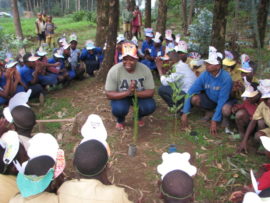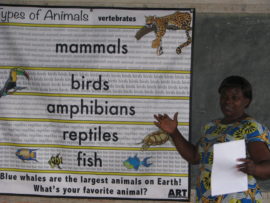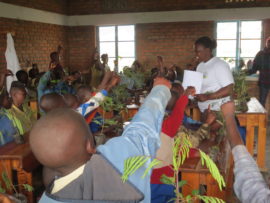Helping Communities to Help Gorillas in Rwanda
Here at the Houston Zoo we are proud to support a number of organizations that work tirelessly to protect mountain gorillas in the wild. One of these organizations, Conservation Heritage-Turambe (CHT) runs after-school programs for local primary school students and community outreach efforts that promote both healthy living habits and gorilla conservation through education and empowerment in communities bordering Volcanoes National Park in Rwanda.
CHT puts added emphasis on the importance of good hygiene in their programming, due to humans and gorillas in these communities living in close proximity to one another. Gorillas and humans are genetically very similar, and as a result human illnesses have the potential to spread to wild gorilla populations. In addition to teaching good habits, CHT also works to improve the livelihood of people in these communities, making adopting good hygiene practices easier. Last year the Houston Zoo provided a water tank for a CHT partner school, enabling 1,500 school children as well as their families and other members of the community to access clean water. In addition, two school gardens and 40 kitchen gardens were built, inspiring the local community to eat a healthy diet while lessening the need for people to venture into gorilla habitat looking for vegetables.
Promoting good hygiene practices is certainly important, but it is only one piece of the puzzle. CHT also works with students to help them understand the importance of protecting mountain gorillas and their habitat. In 2017, 219 students enrolled in a year-long after school conservation and health education program. 200 of these students received sheep that their families can use as a source of alternative income. The sheep can be used to provide wool that can be sold, which acts as a replacement for harvesting fire wood from the forest to sell. By the end of the year-long program, 78% of students reported that they better understood why mountain gorillas are important to their community, and almost 90% said that they learned that trees are important because of their role as animal habitat, their ability to prevent soil erosion, and their ability to produce the oxygen that we breathe!
When it comes to saving wildlife, there is never a “one size fits all solution”. Our partners at CHT are a great example of how creative solutions to multiple obstacles can positively contribute to conservation efforts. By helping to meet the communities’ needs, while also including community members in the discussion about issues facing wildlife and what actions each individual can do to help save them, projects like CHT not only provide a brighter future for wildlife, but for their human counterparts as well.
